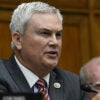The Republican Study Committee (RSC) has proposed a budget that balances in just four years while holding tax revenue at near its historical average. It advances more aggressive entitlement reforms than the House Budget Committee plan, including Social Security, and features deeper spending cuts.
Nevertheless, the plan also suffers weaknesses, including too little funding for national defense and inadequate detail to justify all its spending reductions. Another failing is that, like the committee budget, it keeps revenues near the levels reached with the Obamacare tax hikes even though it repeals the health care bill’s spending provisions.
National Defense. Like the committee budget, the RSC plan adheres to the caps in the Budget Control Act without sequestration. This will probably be much better than the President’s budget policy, which is unlikely to repeal sequestration. Nevertheless, under this plan, defense spending would fall below its previous low-water mark of 3 percent of gross domestic product (GDP). This is far too little with countries such asNorth Korea andIran showing ever-greater military ambitions.
Non-Defense Discretionary Spending. As a share of the economy, non-defense discretionary spending in the RSC budget plunges to 1.5 percent of GDP, less than half its previous lowest level. This would require significant reassessments of the federal government’s role in a wide range of activities, from transportation to education to scientific research—far more than the small and limited cuts identified in the RSC’s report.
Energy. The RSC budget goes a long way to returning ownership of the energy sector to states and individuals. The RSC aims to remove the red tape that has caused production on federal lands to fall. It also approves liquefied natural gas exports as beneficial to the nation and expressly rejects a carbon tax for its certain destructive effect on Americans. It properly reins in the Environmental Protection Agency from regulating or considering the effect of greenhouse gas emissions in rules and allows states to steward their portion of the Outer Continental Shelf as they see fit.
Obamacare. Like the committee budget, the RSC plan appropriately repeals the two major new entitlements included in Obamacare, the Medicaid expansion and exchange subsidies—the heart of the intrusive health care overhaul. This saves more than $1.8 trillion over the next 10 years and is necessary to clear the way for patient-centered, market-based health care.
Medicare. The RSC budget transitions Medicare into a premium-support model by 2019, five years sooner than the Ryan budget. Current Medicare spending is unsustainable, and the sooner competition is allowed to bring costs down, the better. This is another important step toward consumer-based health care.
Medicaid. The RSC budget would combine Medicaid and the Children’s Health Insurance Program funding into a single block grant to the states. This is a key first step, but equally as important are the underlying policy changes to reform Medicaid, such as premium support and more patient-centered care models.
Social Security. Much to its credit, the RSC plan is the only budget this year willing to tackle Social Security, though it could have done more. The RSC budget would slowly increase the age of eligibility by two months per year until the full retirement age reaches 70 for individuals born in 1979 or later. It would also adopt the more realistic chained consumer price index for determining cost-of-living adjustments, which could save $127 billion over 10 years, the RSC says.
A principal feature that is lacking, however, is a strengthened, secure benefit (such as the Heritage Social Security flat benefit) to improve the program for seniors currently receiving benefits below the poverty level. Moreover, the RSC budget preserves Social Security as a universal retirement program when it should be returned to real insurance that focuses assistance on those in need.
Student Loans. The RSC budget would limit the spending spree on federal student loans and grants, representing a step in the right direction. It would eliminate the mandatory add-on for Pell Grants and would limit undergraduate loan subsidies. Continuing to increase federal subsidies and grants will not solve the college cost problem. Instead, as history shows, it will only exacerbate tuition and fees by enabling colleges to charge more.
Anti-Poverty Programs. The RSC budget rightly restores work requirements in the Temporary Assistance for Needy Families (TANF) program, which the Obama Administration gutted last summer. It ought to expand workfare to others among the roughly 80 means-tested welfare programs, beginning with food stamps.
Effective welfare reform can save $2 billion a year, but controlling welfare spending depends on clearly explaining to the public—in a way that is missing here—the size and scope of the $1 trillion means-tested welfare state and the significance of work and marriage to overcome dependence where spending has failed. Conservative rhetorical leadership should aim to tap strong public support for making welfare a hand up, not a handout.
Tax Reform. The RSC rightly identifies tax reform as a major policy improvement the nation needs to spur economic growth. The group’s tax reform plan would set up an optional system with two rates, 15 percent and 25 percent, and a large standard deduction ($25,000 per family) and personal exemptions ($12,500 for each dependent). This means that a family of four would pay no income tax on their first $50,000 of income. The RSC plan would set the tax rate on investment at 15 percent, cut the corporate rate to 25 percent, and index capital gains for inflation.
As noted above, the budget maintains the tax revenue levels associated with Obamacare’s tax hikes. Because the spending is repealed, so too should be the tax revenues. Moreover, the RSC plan may not raise the 18.5 percent of GDP the tax code has raised on average since the end of World War II. By defining a tax base first, then applying a new lower rate, the RSC could achieve all its policy objectives and raise sufficient revenue, as The Heritage Foundation does with the New Flat Tax.
The following Heritage experts also contributed to this report: Steve Bucci (national defense), Lindsey Burke (education), Alyene Senger (health care), Romina Boccia (Social Security), Rachel Sheffield (anti-poverty spending), and Curtis Dubay (taxes).



























